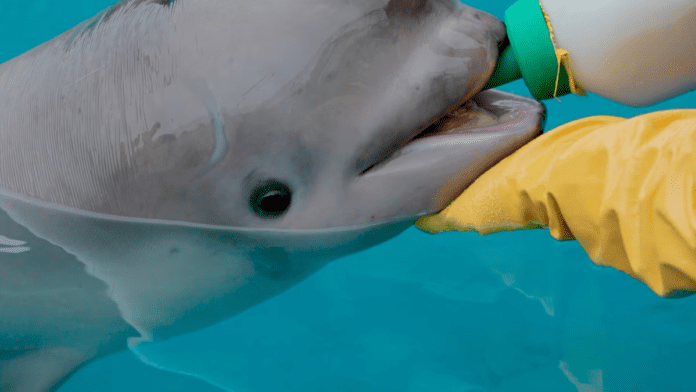Tyonek, a 5-year-old male beluga whale, is thriving in the beluga pod at SeaWorld San Antonio in Texas, helping other young belugas learn crucial behaviors and skills, from diving for prey to vocalizing.
His favorite activities include tongue and back rubs and splashing his human companions.
Tyonek also participates in his own medical care, helping staff at SeaWorld San Antonio to monitor his body condition and getting his blood drawn.
He’s come a long way from that September day in 2017 when then-NOAA Enforcement Officer Noah Meisenheimer spotted the 1-month-old beluga stranded on a mudflat in Trading Bay, Cook Inlet, Alaska. Meisenheimer was in the midst of conducting an aerial enforcement patrol with an Alaska State Trooper helicopter pilot when they spotted what they thought was a dead beluga, and landed to collect the calf for a necropsy.
Instead, they determined by the whale calf was alive and needed help fast.
Meisenheimer received authorization from NOAA Fisheries Alaska Protected Resources Division and the Marine Mammal Health and Stranding Response Program to encourage the little whale to move into deeper waters.
“He would swim on his own for a little while, but kept turning around to swim back to shore,” Meisenheimer said.
Fortunately they were able to get Tyonek transferred to the Alaska SeaLife Center (ASLC) in Seward, where a team of veterinarians from the Georgia Aquarium, Mystic Aquarium, SeaWorld, Shedd Aquarium and Vancouver Aquarium worked collaboratively to help the calf recover from a range of ailments ranging from pneumonia and constipation to sunburn and fluid on the brain.
He was so weak that for his first few days at ASLC he was in a sling by the rehabilitation pool, unable to swim. Initially he had to be fed through a tube, but within 72 hours he was being bottle fed and phased out of tube feeding. A month later his lung collapsed, but with help from the veterinarians, and funding from NOAA Fisheries, he recovered.
When he was nearly 4 months old, NOAA Fisheries determined that Tyonek would not be able to live in the wild because he lacked the socialization and skills to survive on his own.
Formal procedures began to find a permanent care facility in the United States for Tyonek — somewhere that could accommodate his medical and social needs, support all necessary transportation and integration logistics, and contribute to scientific research to help protect wild belugas. SeaWorld San Antonio was selected because the center has adult female belugas and young male calves that would be important in Tyonek’s social development. NOAA Fisheries worked with ASLC and SeaWorld San Antonio to accommodate his transport to Texas. Tyonek was moved by truck from Seward to Anchorage, and then by a chartered aircraft to San Antonio.
Given his digestive issues, it took time for Tyonek to acclimate and adjust to fish feedings. He learned how to dive for food, vocalize, and he proved to be quite playful.
NOAA Fisheries spokespersons said that by monitoring Tyonek as he grows to become an adult beluga, scientists have learned important information about his behavioral and physical development, including his hearing, social interactions, vocalizations, and overall body condition. This knowledge is used to help protect, rehabilitate and support captive and wild beluga populations, specifically Cook Inlet beluga whales — one of nine endangered species that NOAA Fisheries has identified in its Species in the Spotlight initiative to stabilize population declines and focus resources on marine mammals that are most at risk of extinction in the near future.
NOAA officials encourage anyone who sees a stranded, entangled, injured, or dead marine mammal to call the NOAA Fisheries Alaska Statewide 24-hour Stranding Hotline at (877) 925-7773, and await further direction. To report violations of the Marine Mammal Protection Act or Endangered Species Act, call NOAA’s Office of Law Enforcement at (800) 853-1964.






